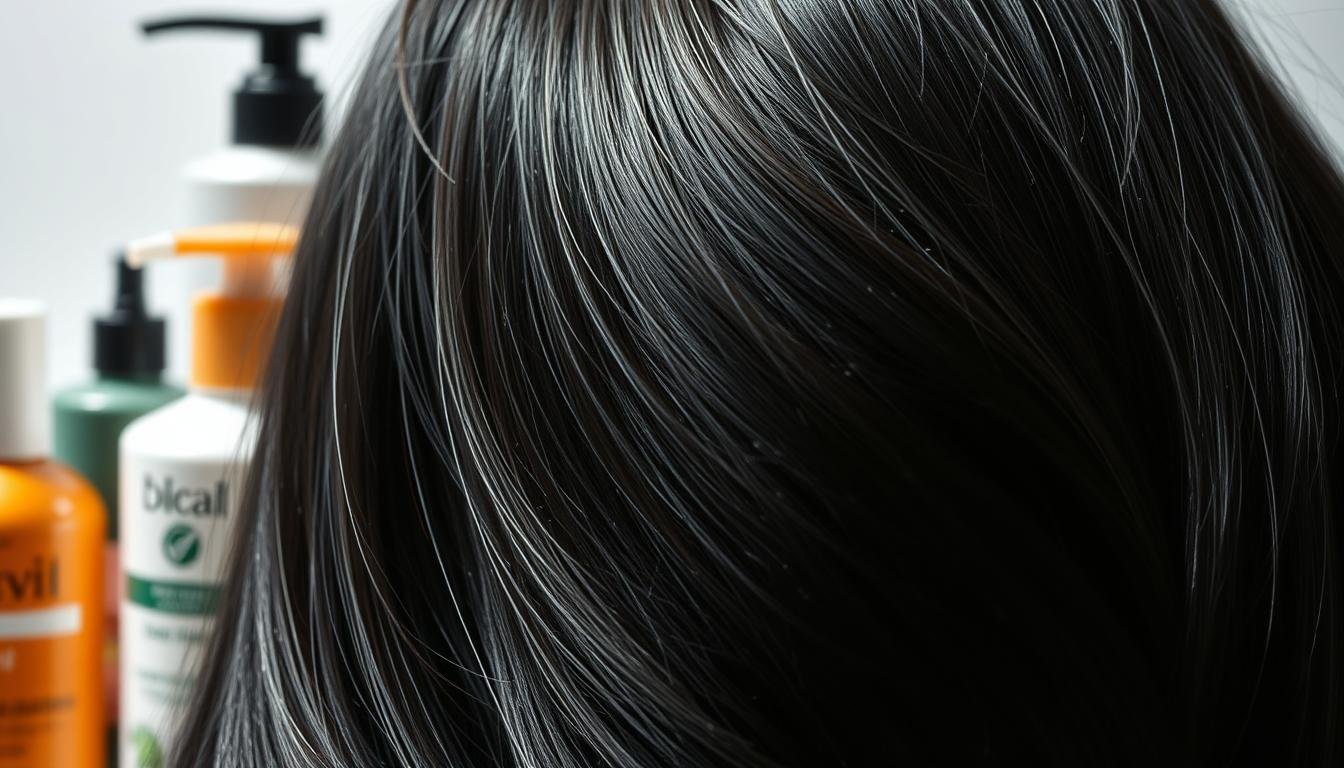What Are the Best Products for Oily Hair?
Did you know that the average human scalp produces up to 30 times more oil than other areas of the body? This staggering statistic underscores the urgent need for effective hair care solutions for those with oily hair. Navigating the vast array of shampoos, conditioners, and styling products can be daunting, but fear not – we’ve got you covered with the best products to tame your oil-prone tresses.
Key Takeaways
- Clarifying shampoos with ingredients like salicylic acid, tea tree oil, and micellar water can effectively deep cleanse and remove excess oil from the scalp.
- Lightweight, silicone-free conditioners help balance hydration without weighing hair down or exacerbating oiliness.
- Dry shampoos provide a convenient, oil-absorbing solution between washes, extending the life of your hairstyle.
- Scalp treatments, such as exfoliating scrubs and clay masks, can help regulate sebum production and unclog pores.
- Styling products formulated for volume and hold, like lightweight mousse and non-greasy gels, can add lift without contributing to greasiness.
Understanding Oily Hair and Its Causes
Oily hair is a common concern for many individuals, resulting from the overproduction of sebum by the scalp’s sebaceous glands. This excess oil can lead to a greasy, heavy, and dull appearance, as well as potential issues like dandruff and clogged hair follicles. Understanding the underlying causes of oily hair is crucial in developing an effective hair care routine to manage this condition.
Common Causes of Oily Hair
Oily hair can be attributed to a variety of factors, including genetics, hormonal changes, and environmental influences. Some individuals naturally have more active oil-producing glands, predisposing them to oily hair. Hormonal fluctuations, particularly during puberty, pregnancy, or menopause, can also trigger increased sebum production.
How Hormones Affect Oil Production
Hormonal changes can significantly impact oil production in the scalp. During puberty, the increase in androgen hormones stimulates the sebaceous glands to produce more sebum, leading to oily hair. Similarly, fluctuations in hormones during pregnancy or menopause can also contribute to an oily scalp.
Environmental Factors Contributing to Oily Scalp
Environmental factors, such as humidity and pollution, can also exacerbate oily hair concerns. In humid environments, the excess moisture in the air can make it more difficult for the scalp’s natural oils to evaporate, resulting in a greasy appearance. Additionally, exposure to pollutants and dirt can clog pores and lead to increased oil production.
Recognizing the underlying causes of oily hair is the first step in developing an effective Hair Care routine to manage this common concern. By understanding the role of hormones, genetics, and environmental factors, individuals can tailor their approach and utilize the right oil-blotting papers and anti-humidity hair products to achieve healthier, more manageable hair.
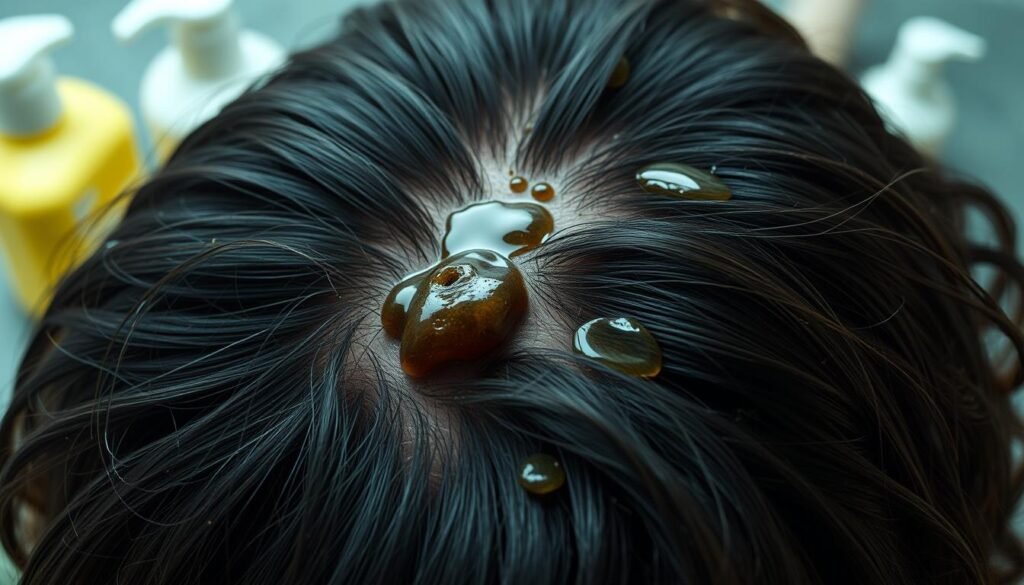
The Importance of Choosing the Right Shampoo
Managing oily hair is a common challenge for many individuals, and selecting the appropriate shampoo is a crucial step in addressing this issue. Clarifying shampoos, such as clarifying shampoo, play a vital role in effectively removing excess buildup and oil from the scalp, restoring a healthy balance.
Clarifying Shampoos for Oily Hair
Clarifying shampoos are formulated to deeply cleanse the scalp, removing stubborn residues, product buildup, and excessive sebum. These shampoos can help control the appearance of greasy hair and provide a fresh, lightweight feel. Neutrogena Anti-Residue Shampoo and L’Oreal Paris Elvive Extraordinary Clay Shampoo are two popular options known for their ability to address oily hair concerns.
Ingredient Spotlight: Tea Tree Oil
One key ingredient to look for in shampoos for oily hair is tea tree oil. This natural Essential oil possesses natural clarifying properties that can help regulate sebum production and maintain a balanced scalp environment. Kérastase Specifique Bain Divalent Shampoo and Avalon Organics Clarifying Lemon Shampoo are examples of shampoos that incorporate tea tree oil for effective oil control.
Benefits of Sulfate-Free Formulas
While traditional shampoos may contain sulfates, which can effectively remove excess oil, they can also strip the hair and scalp of their natural oils, leading to overcompensation and increased oiliness. Sulfate-free formulas, such as Olaplex No. 4C Bond Maintenance Clarifying Shampoo and Bumble and Bumble Sunday Shampoo, offer a gentler cleansing experience while maintaining a healthy scalp balance.
By understanding the importance of choosing the right shampoo and incorporating key ingredients like tea tree oil and sulfate-free formulas, individuals with oily hair can effectively manage their scalp’s oil production and achieve a cleaner, fresher-looking appearance.
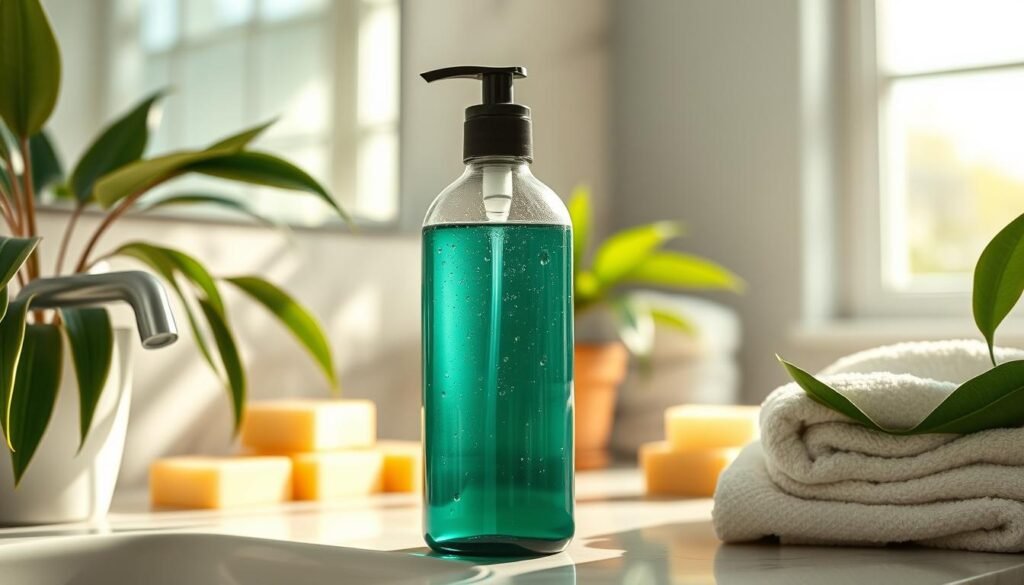
Top Shampoos for Oily Hair
If you’re struggling with an oily scalp and greasy strands, the right shampoo can make all the difference. After extensive testing of 15 of the most popular oil- and grease-fighting formulas, several standout options have emerged as the best shampoos for oily hair.
Nécessaire The Shampoo
Topping the list is the Nécessaire The Shampoo, which was found to be the most effective for oily hair out of all the shampoos tested. Its potent yet gentle formula deeply cleanses the scalp without stripping the hair of essential moisture.
Kristin Ess Clarifying Shampoo
For a more budget-friendly option, the Kristin Ess Clarifying Shampoo is an excellent choice. This shampoo effectively cuts through excess oil and buildup, leaving hair feeling refreshed and lightweight.
L’Oreal Paris Elvive Extraordinary Clay Shampoo
The L’Oreal Paris Elvive Extraordinary Clay Shampoo is another top performer, containing three types of refined clay to reduce oil at the roots while nourishing the hair. This clarifying shampoo is a great option for those with oily hair.
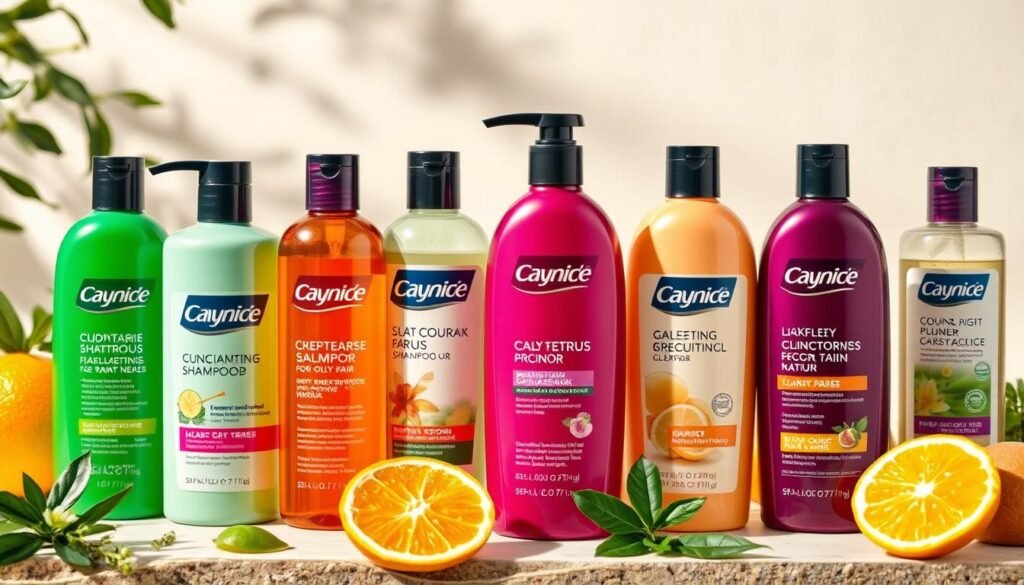
Remember, those with very oily hair may need to shampoo daily to maintain a fresh, grease-free look. Typically, shampoos for oily hair contain lower concentrations of rich, hydrating ingredients and more powerful detergents or exfoliants to remove excess oil. Finding the right formula can be a game-changer for managing oily hair.
Best Conditioners for Oily Hair
Maintaining healthy, manageable hair when dealing with an oily scalp can be a delicate balance. The key is to find lightweight, non-greasy conditioners that won’t weigh down your strands or contribute to further oiliness. Silicone-free formulas are especially beneficial, as they won’t leave behind a heavy residue that can clog pores and exacerbate the issue.
Lightweight Conditioners to Consider
Look for conditioners that contain moisturizing ingredients like aloe vera, coconut oil, and argan oil, which can hydrate hair without leaving it feeling greasy. Avoid heavy butters like shea and cocoa, as they may be too emollient for oily hair types. Brands like Davines, Verb, and Monday Haircare offer excellent lightweight conditioner options suited for those with an oily scalp.
Silicone-Free Options for Better Results
Silicones can build up on the hair over time, weighing it down and contributing to an oily appearance. Opt for silicone-free conditioners to prevent this issue and achieve better, more balanced results. Malin + Goetz, R+Co, and Blu Atlas all have silicone-free formulas perfect for oily hair.
How to Apply Conditioner Properly
When applying conditioner, focus on the ends of your hair rather than the scalp area. This helps avoid over-conditioning the roots, which can lead to increased greasiness. Rinse thoroughly to remove any excess product. For an extra boost, try using a clarifying conditioner once a week to remove product buildup and rebalance oil production.
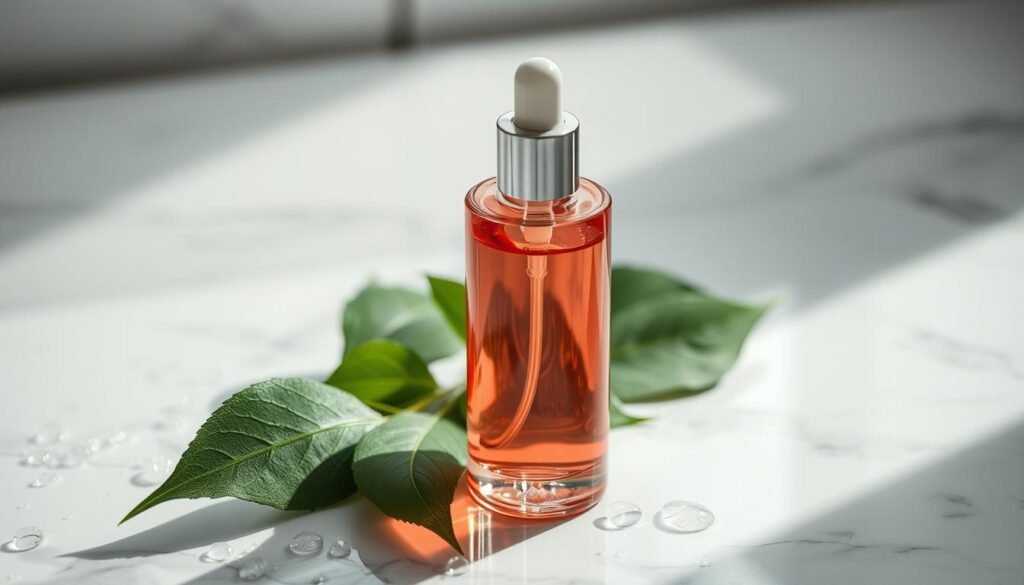
“The key to managing oily hair is finding the right balance of cleansing and hydration – not too much, not too little.”
Effective Dry Shampoos for Oily Hair
Between washes, dry shampoos can be a game-changer for managing oily hair. These handy products absorb excess sebum, refreshing your locks and extending the time between full shampoos. When it comes to the best dry shampoos for oily hair, a few standout options have emerged as top performers.
Benefits of Dry Shampoo for Oily Scalps
Dry shampoos offer a range of benefits for those with an oily scalp and hair. They can:
- Absorb excess oil and grease, keeping hair fresh and clean-looking
- Add volume and texture to limp, flat hair
- Extend the time between full shampoos, reducing over-washing
- Provide a quick refresh when you don’t have time for a full hair wash
Top Picks: Batiste Original Dry Shampoo
A long-time favorite, Batiste Original Dry Shampoo is a budget-friendly option that effectively soaks up oil. With a quick spritz at the roots and a quick brush-through, it leaves hair looking clean and refreshed. At just $14 per can, it’s a cost-effective solution for managing oily hair between washes.
Tips for Using Dry Shampoo Effectively
To get the most out of your dry shampoo, apply it to the roots and let it sit for a few minutes before brushing through. This allows the powder to fully absorb excess oil. Be sure to use it sparingly, as overuse can lead to buildup and dullness. For an added boost, try a volumizing oil-absorbing dry shampoo or volumizing hairspray to add lift at the roots.
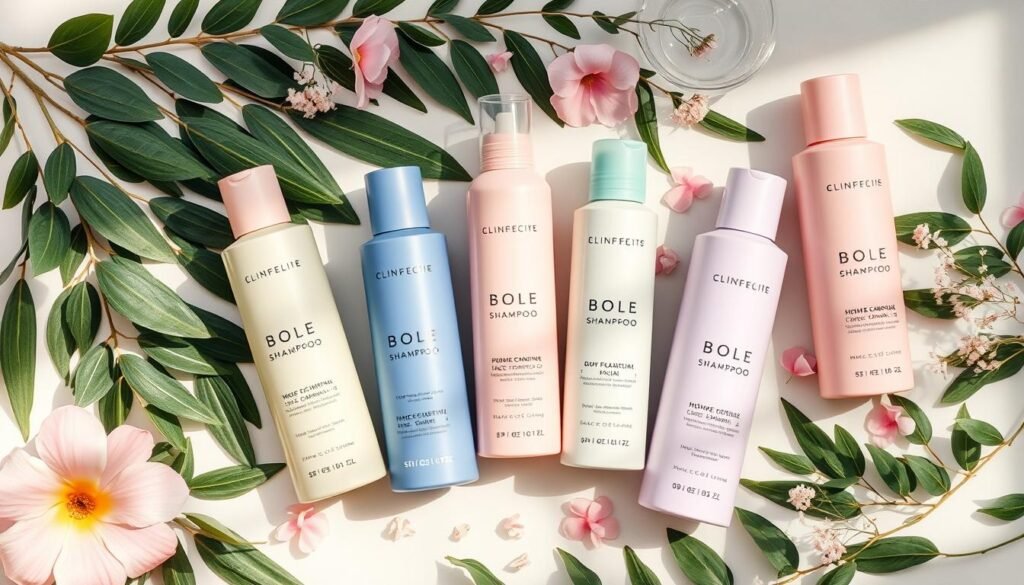
“Dry shampoo has been a lifesaver for me, especially on those days when I just can’t fit in a full hair wash. It keeps my oily roots at bay and gives my hair great volume and texture.” – Sarah, beauty blogger
Scalp Treatments to Control Oil
Maintaining healthy, balanced hair starts with treating the root of the problem – your scalp. For those struggling with an oily scalp and hair, scalp treatments can be a game-changer in regaining control of oil production. From exfoliating scrubs to nourishing clay masks, these targeted solutions can help combat excess sebum and leave your hair looking and feeling its best.
Exfoliating Scalp Scrubs
One of the most effective ways to manage an oily scalp is by incorporating a regular exfoliating scrub. These scrubs, often containing ingredients like charcoal scalp scrub, help remove built-up dirt, dead skin cells, and product residue that can clog pores and contribute to excess oil production. Gently massaging a scalp scrub into the skin can help stimulate circulation and promote a healthier, more balanced scalp environment.
The Role of Clay Masks
Clay masks, such as those containing kaolin or bentonite clay, can be a powerful ally in the battle against oily hair. These masks work by absorbing excess sebum and impurities from the scalp, leaving it feeling refreshed and balanced. Incorporating a clay mask into your weekly haircare routine can help control oil production and leave your hair feeling lighter and more manageable.
Essential Oils for Balancing Oil Production
- Tea Tree Oil: Known for its purifying and clarifying properties, tea tree oil can help regulate sebum production and soothe an irritated scalp.
- Rosemary Oil: This versatile essential oil can help stimulate circulation, promote healthy hair growth, and balance oil levels.
- Apple cider vinegar rinse: An apple cider vinegar rinse can help restore the scalp’s pH balance, reducing excess oil and improving the overall health of your hair and scalp.
By incorporating these targeted scalp treatments into your haircare routine, you can take a proactive approach to managing oily hair and achieving a more balanced, healthy-looking appearance.
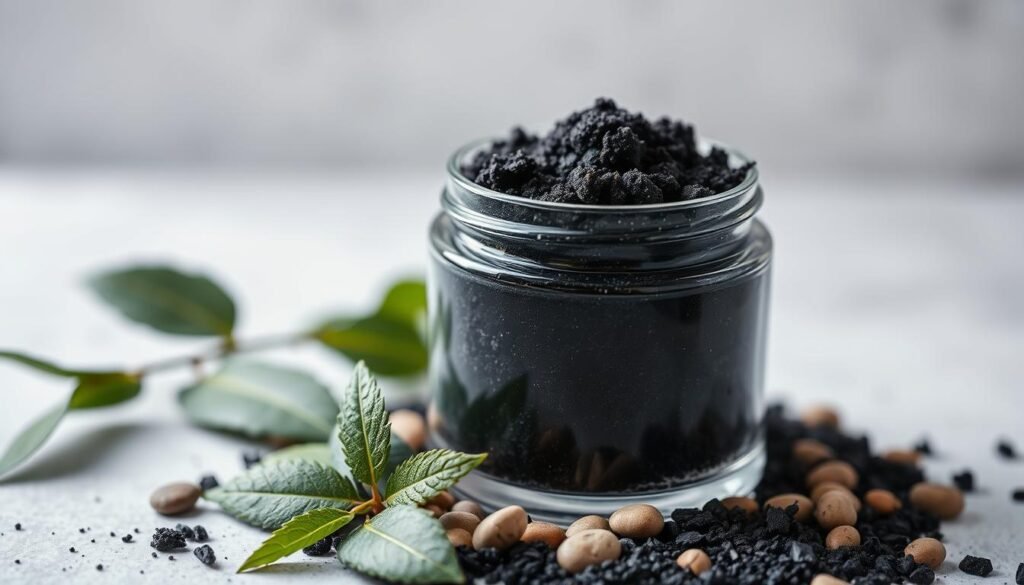
Styling Products That Won’t Weigh You Down
When you have oily hair, it’s crucial to choose styling products that won’t add extra grease or heaviness to your locks. Opt for lightweight, volumizing formulas that can provide hold and texture without weighing you down. Avoid heavy oils and serums that may exacerbate the oily appearance of your hair.
Lightweight Mousse for Volume
A volumizing hairspray can be a game-changer for oily hair. Look for a lightweight mousse that can add body and lift to your style without leaving a greasy residue. Brands like Kenra Professional offer volumizing hairspray options that are specifically designed for fine, oily hair types.
Non-Greasy Hair Gels and Sprays
In addition to mousse, non-greasy hair gels and sprays can be excellent styling allies for managing oily hair. These formulas provide flexible hold without weighing down your strands or contributing to an overly shiny, greasy appearance. Consider trying a lightweight hair serum for added shine and smoothing benefits without the heavy feel.
Avoiding Heavy Oils and Serums
Steer clear of heavy, oil-based styling products, as they can exacerbate the oily look and feel of your hair. Instead, opt for water-based or silicone-infused formulas that won’t leave your hair feeling weighed down or greasy. Experiment with different products to find the right balance of hold, volume, and shine without the unwanted oiliness.
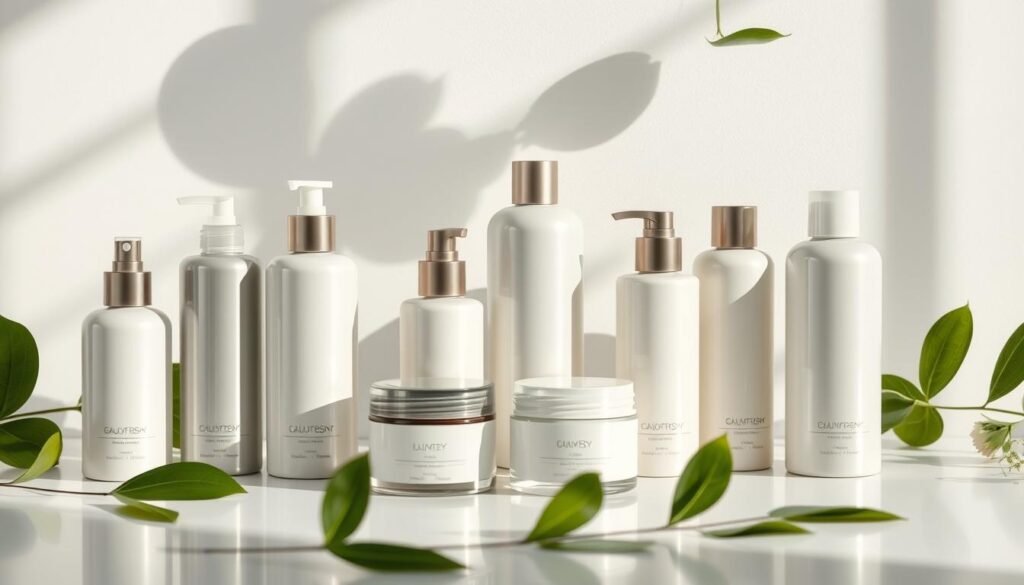
DIY Remedies for Oily Hair
When it comes to managing oily hair, sometimes the best solutions can be found right in your own kitchen. Homemade hair masks and herbal rinses made with natural ingredients can help address the root causes of excess oil production and provide a refreshing, grease-free boost to your locks.
Homemade Hair Masks with Natural Ingredients
Whip up a nourishing hair mask using ingredients like clay, egg whites, or lemon juice to absorb excess oil and leave your hair feeling clean and balanced. The charcoal scalp scrub can also be an effective DIY treatment, gently exfoliating the scalp to remove built-up sebum and impurities.
Herbal Rinses to Reduce Oiliness
An apple cider vinegar rinse can help restore your scalp’s pH balance, while the antimicrobial properties of rosemary or mint can minimize oil production. These natural rinses can be easily incorporated into your weekly haircare routine for long-lasting results.
Simple Lifestyle Changes
- Avoid frequently touching your hair, as the oils from your hands can contribute to an oily appearance.
- Use a clean pillowcase regularly to prevent oil transfer from your skin to your hair overnight.
- Plan your shampoo schedule around sweaty workouts to prevent sweat from spreading oils throughout your hair.
By harnessing the power of natural ingredients and making a few simple lifestyle adjustments, you can effectively Manage oily hair and achieve a fresh, vibrant appearance without the need for harsh, commercial products.
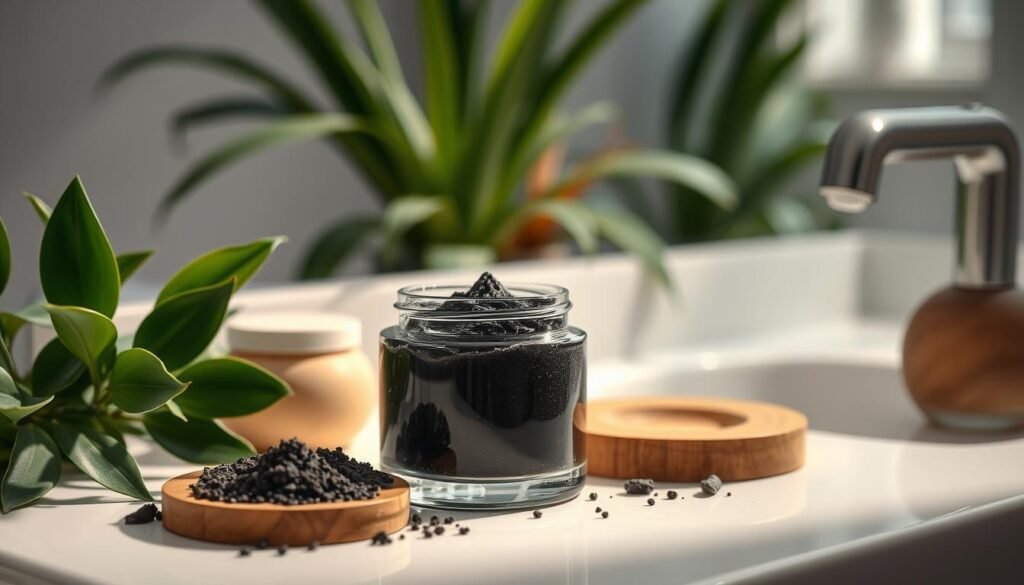
Recommended Hair Tools for Oily Hair
Maintaining healthy, oil-free hair requires the right hair tools. From combs and brushes to hair dryers, selecting the appropriate tools can make a significant difference in managing oily hair.
Combs and Brushes to Avoid Grease
Opt for wide-toothed combs or boar bristle brushes when dealing with oily hair. These tools help distribute natural oils evenly without adding excess grease to the scalp. Avoid using fine-toothed combs or brushes with synthetic bristles, as they can push oil-laden hair strands down, leading to a greasy appearance.
Using the Right Hair Dryer for Volume
Invest in an ionic hair dryer, as these can help reduce frizz and add volume to oily hair. The negative ions produced by ionic dryers help seal the hair cuticle, preventing excess oil from weighing down the strands. Set the dryer to a medium or low heat setting to avoid excessive drying, which can stimulate increased oil production.
How Proper Brushing Can Help
Proper brushing techniques can also assist in managing oily hair. Brush from roots to ends, rather than just the ends, to evenly distribute natural oils throughout the hair. This helps prevent oil buildup at the scalp while maintaining healthy-looking locks. Avoid over-brushing, as it can stimulate the sebaceous glands to produce more oil.
| Hair Tool | Benefit for Oily Hair |
|---|---|
| Wide-toothed Comb | Distributes oils evenly without adding excess grease |
| Boar Bristle Brush | Helps spread natural oils from roots to ends |
| Ionic Hair Dryer | Reduces frizz and adds volume to oily hair |
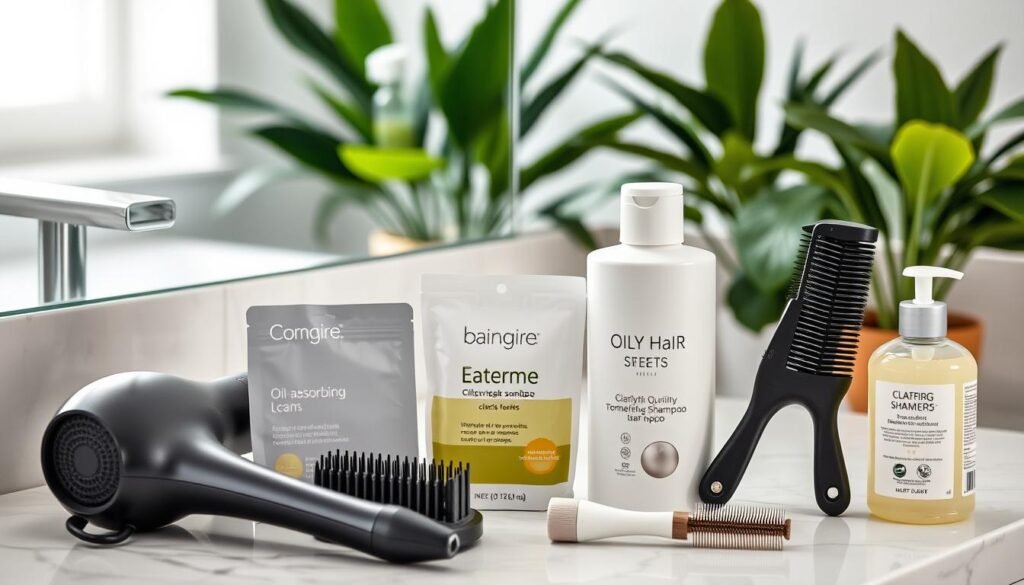
By selecting the right hair tools and using them properly, you can effectively Manage oily hair and maintain a healthy, vibrant appearance. Experiment with different products and techniques to find the perfect combination for your unique hair needs.
Incorporating a Healthy Hair Care Routine
Maintaining healthy, balanced hair is key for managing oily hair. By adopting a strategic Hair Care routine, you can effectively control excess oil production and keep your locks looking fresh and vibrant.
Frequency of Washing for Oily Hair
The recommended frequency for washing oily hair is 2-3 times per week. Using a clarifying shampoo once a week can help remove buildup and residue, preventing further oil accumulation. Avoid over-washing, as this can strip the hair of its natural oils, leading to excess oil production.
Balancing Between Shampoo and Conditioner
When caring for oily hair, it’s essential to strike the right balance between shampooing and conditioning. Focus on applying conditioner only from the mid-length to the ends of your hair, avoiding the scalp area. This helps to hydrate and nourish the hair strands without weighing down the roots and contributing to greasiness.
The Role of a Good Diet
Your diet can play a significant role in regulating oil production on the scalp. Incorporating a balanced diet rich in vitamins, minerals, and healthy fats can help nourish the hair from the inside out. Foods like apple cider vinegar, nuts, and lean proteins can all contribute to a healthier scalp and hair.
“A balanced diet rich in vitamins and minerals can help regulate oil production from within.”
By establishing a consistent and personalized hair care routine, incorporating the right products, and maintaining a healthy lifestyle, you can effectively manage oily hair and achieve the desired balance and control over your hair’s appearance.
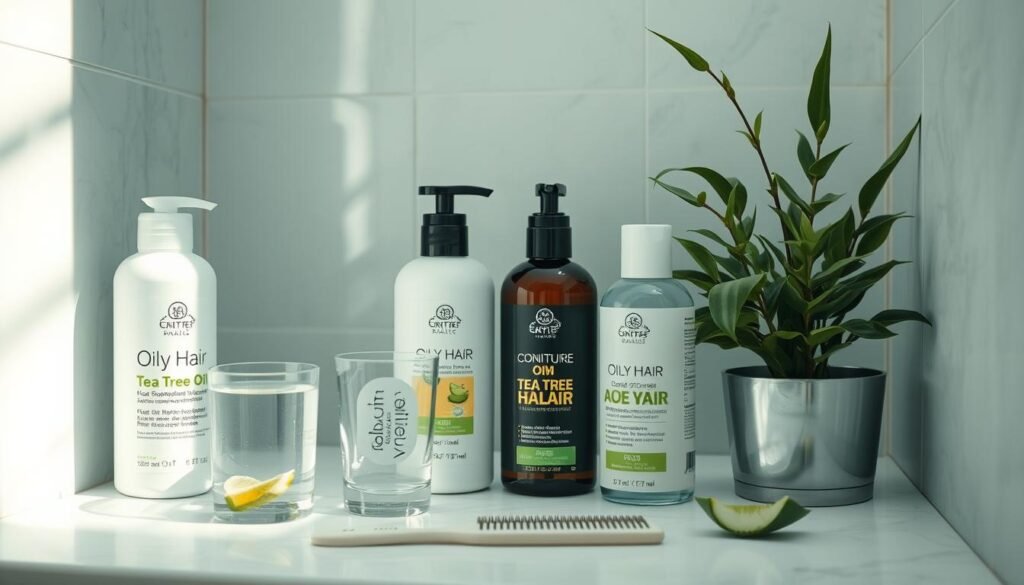
Additional Tips for Managing Oily Hair
Maintaining healthy, balanced hair goes beyond just selecting the right shampoo and conditioner. There are several additional tips and techniques that can help manage the challenges of oily hair. From keeping hair off your face to managing stress, incorporating these strategies can make a significant difference in your hair’s appearance and overall well-being.
Keeping Hair Off Your Face
One of the easiest ways to prevent oil transfer from your skin to your hair is to keep your hair away from your face. This can be achieved through simple hairstyles like pulling your hair back, using headbands, or wearing it in a ponytail or bun. Minimizing the contact between your hair and face can help reduce the amount of oil that gets absorbed into your strands.
The Impact of Stress on Oil Production
Stress can be a major contributor to increased oil production in the scalp. When you’re under stress, your body produces more cortisol, a hormone that can stimulate the sebaceous glands to produce excess oil. To combat this, try incorporating stress-reducing activities like exercise, meditation, or deep breathing exercises into your daily routine. Keeping your stress levels in check can help regulate oil production and improve the overall health of your hair.
Regular Haircuts to Maintain Health
Regular haircuts are not only essential for maintaining a stylish appearance, but they can also play a role in managing oily hair. As your hair grows longer, it becomes more susceptible to split ends and damage, which can lead to oil traveling down the hair shaft. Trimming your hair every 6-8 weeks can help remove these split ends and prevent the oil from spreading throughout your strands, keeping your hair looking fresh and healthy.
In addition to these tips, incorporating the use of oil-blotting papers or mattifying hair powder can provide quick and convenient touch-ups throughout the day, helping to absorb excess oil and maintain a polished, shine-free appearance.
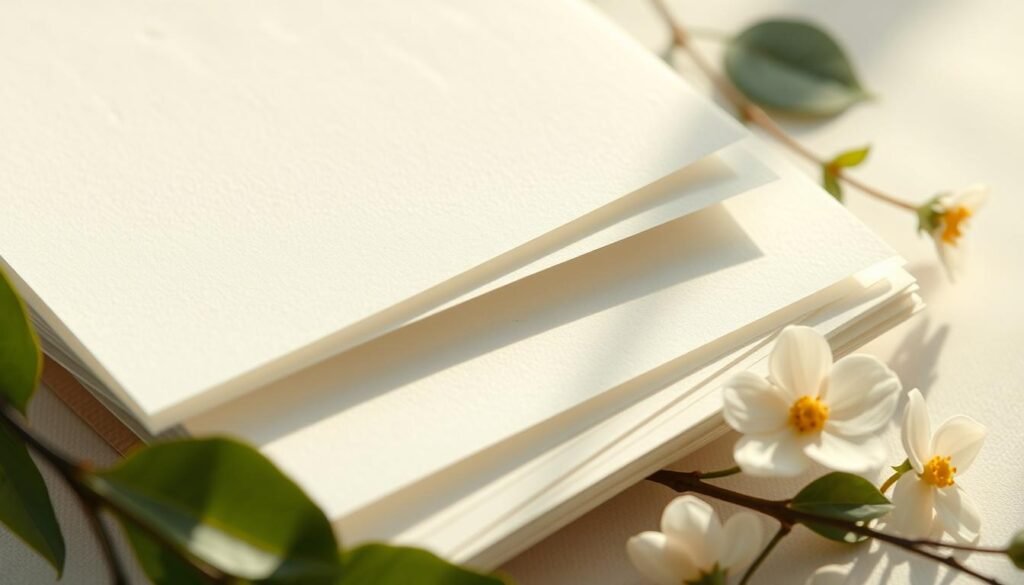
By implementing these additional strategies, along with a balanced hair care routine, you can take a comprehensive approach to managing oily hair and achieve the healthy, vibrant locks you desire.
Conclusion: Finding What Works for You
Managing oily hair is a unique journey, and finding the right solutions often requires personalized care and experimentation. While certain products and techniques may work well for some, what works best for you may differ. The key is to approach your hair care routine with an open mind and a willingness to try different options until you discover the perfect combination.
Personalized Care for Oily Hair
Oily hair can be a frustrating condition, but with the right approach, you can regain control and achieve a healthy, balanced scalp. By understanding your individual Hair Type, lifestyle factors, and scalp needs, you can create a customized routine that addresses your specific concerns. Incorporating clarifying shampoos, lightweight conditioners, and oil-absorbing dry shampoos can be a great starting point.
Experimenting with Products and Techniques
The beauty industry offers a wide array of products designed to Manage oily hair, from clarifying shampoos to nanotech-infused formulas. Be patient and give each product a fair chance, as it may take time to see the desired results. Don’t be afraid to mix and match different brands, or to adjust the frequency and application of your hair care routine as needed. Experimentation is key to finding the perfect balance for your oily hair.
Final Thoughts on Oily Hair Solutions
Ultimately, the best solutions for oily hair are those that work best for you. By staying informed about the latest advancements in hair care, such as the benefits of nanotechnology, and by keeping an open mind to trying new products and techniques, you can find the right combination to keep your hair looking and feeling its best. Remember, every person’s hair and scalp are unique, so be patient, listen to your hair, and don’t be afraid to adjust your routine until you achieve the desired results.
FAQ
What are the best products for oily hair?
The best products for oily hair include clarifying shampoos, lightweight conditioners, and oil-absorbing dry shampoos. Some top options are Maria Nila Pure Volume Shampoo, Ouai Fine Hair Shampoo, and Neutrogena T/Sal Therapeutic Shampoo.
What is the role of dry shampoo for oily hair?
Dry shampoos can be effective for managing oily hair as they absorb excess oil between washes, extending the time between shampoos. Batiste Original Dry Shampoo is a popular choice for its effectiveness. Use dry shampoo sparingly to avoid product buildup.
How can I choose the right shampoo for oily hair?
Clarifying shampoos like Neutrogena Anti-Residue Shampoo effectively remove buildup, while sulfate-free formulas such as Olaplex No. 4C Bond Maintenance Clarifying Shampoo cleanse without stripping natural oils. Tea tree oil also has natural clarifying properties.
What type of conditioner works best for oily hair?
Lightweight, silicone-free conditioners are ideal for oily hair to avoid weighing down strands. Apply conditioner only to the ends, avoiding the scalp. OGX Weightless Hydration Coconut Water Shampoo provides lightweight hydration without residue.
How can scalp treatments help control oil production?
Exfoliating scalp scrubs, clay masks, and essential oils like tea tree, rosemary, and peppermint can help absorb excess oil and balance oil production. Apple cider vinegar rinses also help clarify the scalp and restore pH balance.
What styling products are best for oily hair?
Opt for lightweight, non-greasy styling products like volumizing mousses, hair gels, and sprays. Avoid heavy oils and serums that can contribute to oiliness. Kenra Professional Volumizing Shampoo can also help add volume to fine, thin hair.
Are there any DIY remedies for managing oily hair?
Yes, homemade masks using ingredients like clay, egg whites, or lemon juice can help absorb excess oil. Herbal rinses with rosemary or mint can also reduce oiliness. Lifestyle changes like avoiding frequent hair touching and using a clean pillowcase can also help control oil production.
What hair tools are recommended for oily hair?
Wide-toothed combs or boar bristle brushes can help distribute natural oils without adding grease. Ionic hair dryers can also help reduce frizz and add volume. Proper brushing techniques from roots to ends can prevent buildup at the scalp.
How can I develop a healthy hair care routine for oily hair?
Wash hair every other day or as needed, using a clarifying shampoo once a week. Balance between shampooing and conditioning to avoid over-drying or over-moisturizing. A balanced diet rich in vitamins and minerals can also help regulate oil production.
What additional tips can help manage oily hair?
Keep hair off your face to prevent transferring oils from skin to hair. Manage stress through exercise or meditation, as stress can increase oil production. Regular trims help remove Split Ends and prevent oil from traveling down the hair shaft. Use oil-blotting papers or mattifying hair powder for quick touch-ups throughout the day.
